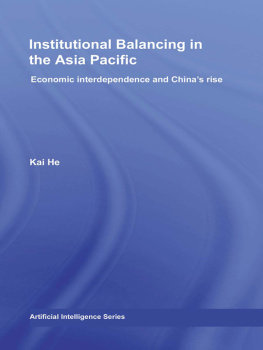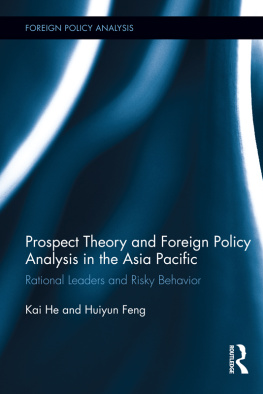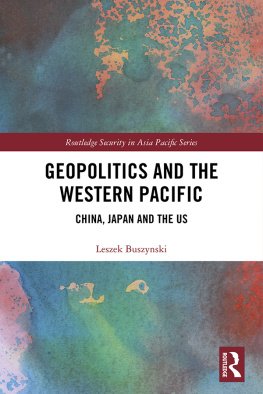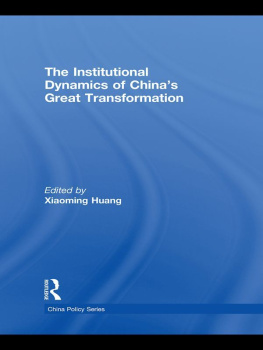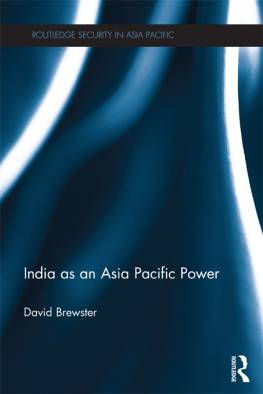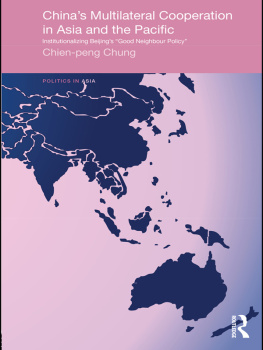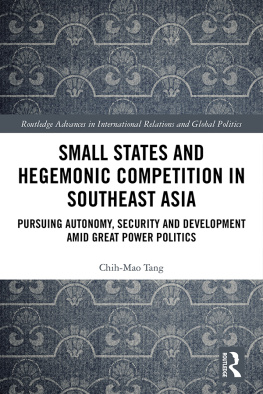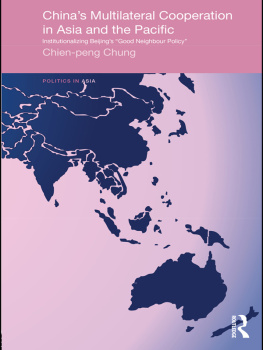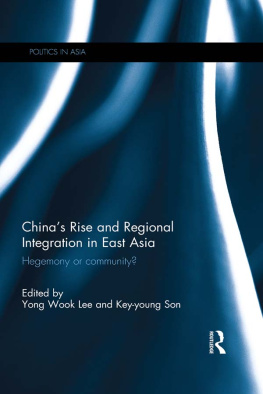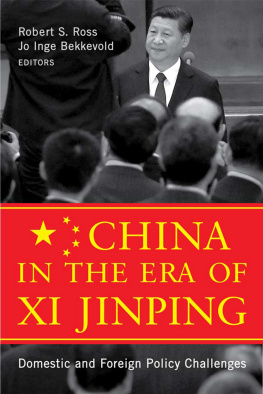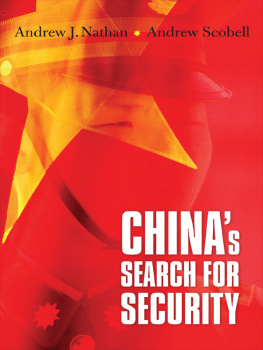Institutional Balancing in the Asia Pacific
This book examines the strategic interactions among China, the United States, Japan, and Southeast Asian states in the context of Chinas rise and globalization after the Cold War. Engaging the mainstream theoretical debates in international relations, the author introduces a new theoretical frameworkinstitutional realismto explain the institutionalization of world politics in the Asia Pacific after the Cold War.
Institutional realism suggests that deepening economic interdependence creates a condition under which states are more likely to conduct a new balancing strategyinstitutional balancing, i.e. countering pressures or threats through initiating, utilizing, and dominating multilateral institutionsto pursue security under anarchy. To test the validity of institutional realism, Kai He examines the foreign policies of the U.S., Japan, the ASEAN states, and China toward four major multilateral institutions, Asia Pacific Economic Cooperation (APEC), the Association of Southeast Asian Nations (ASEAN), Regional Forum (ARF), ASEAN Plus Three (APT), and East Asian Summit (EAS). Challenging the popular pessimistic view regarding Chinas rise, the book concludes that economic interdependence and structural constraints may well soften the dragons teeth. Chinas rise does not mean a dark future for the region.
Institutional Balancing in the Asia Pacific will be of great interest to policymakers and scholars of Asian security, international relations, Chinese foreign policy, and U.S. foreign policy.
Kai He is Assistant Professor of Political Science at Georgia State University.
Routledge contemporary China series
- Nationalism, Democracy and National Integration in China
Leong Liew and Wang Shaoguang
- Hong Kongs Tortuous Democratization
A comparative analysis
Ming Sing
- Chinas Business Reforms
Institutional challenges in a globalised economy
Edited by Russell Smyth and Cherrie Zhu
- Challenges for Chinas Development
An enterprise perspective
Edited by David H. Brown and Alasdair MacBean
- New Crime in China
Public order and human rights
Ron Keith and Zhiqiu Lin
- Non-Governmental Organizations in Contemporary China
Paving the way to civil society?
Qiusha Ma
- Globalization and the Chinese City
Fulong Wu
- The Politics of Chinas Accession to the World Trade Organization
The dragon goes global
Hui Feng
- Narrating China
Jia Pingwa and his fictional world
Yiyan Wang
- Sex, Science and Morality in China
Joanne McMillan
- Politics in China Since 1949
Legitimizing authoritarian rule
Robert Weatherley
- International Human Resource Management in Chinese Multinationals
Jie Shen and Vincent Edwards
- Unemployment in China
Economy, human resources and labour markets
Edited by Grace Lee and Malcolm Warner
- China and Africa
Engagement and compromise
Ian Taylor
- Gender and Education in China
Gender discourses and womens schooling in the early twentieth century
Paul J. Bailey
- SARS
Reception and interpretation in three Chinese cities
Edited by Deborah Davis and Helen Siu
- Human Security and the Chinese State
Historical transformations and the modern quest for sovereignty
Robert E. Bedeski
- Gender and Work in Urban China
Women workers of the unlucky generation
Liu Jieyu
- Chinas State Enterprise Reform
From Marx to the market
John Hassard, Jackie Sheehan, Meixiang Zhou, Jane Terpstra-Tong and Jonathan Morris
- Cultural Heritage Management in China
Preserving the cities of the Pearl River Delta
Edited by Hilary du Cros and Yok-shiu F. Lee
- Paying for Progress
Public finance, human welfare and inequality in China
Edited by Vivienne Shue and Christine Wong
- Chinas Foreign Trade Policy
The new constituencies
Edited by Ka Zeng
- Hong Kong, China
Learning to belong to a nation
Gordon Mathews, Tai-lok Lui, and Eric Kit-wai Ma
- China Turns to Multilateralism
Foreign policy and regional security
Edited by Guoguang Wu and Helen Lansdowne
- Tourism and Tibetan Culture in Transition
A place called Shangrila
shild Kols
- Chinas Emerging Cities
The making of new urbanism
Edited by Fulong Wu
- ChinaUS Relations Transformed
Perceptions and strategic interactions
Edited by Suisheng Zhao
- The Chinese Party-State in the 21st Century
Adaptation and the reinvention of legitimacy
Edited by Andr Lalibert and Marc Lanteigne
- Political Change in Macao
Sonny Shiu-Hing Lo
- Chinas Energy Geopolitics
The Shanghai cooperation organization and Central Asia
Thrassy N. Marketos
- Regime Legitimacy in Contemporary China
Institutional change and stability
Edited by Thomas Heberer and Gunter Schubert
- U.S.China Relations
China policy on Capitol Hill
Tao Xie
- Chinese Kinship
Contemporary anthropological perspectives
Edited by Susanne Brandtstdter and Gonalo D. Santos
- Politics and Government in Hong Kong
Crisis under Chinese sovereignty
Edited by Ming Sing
- Rethinking Chinese Popular Culture
Cannibalizations of the canon
Edited by Carlos Rojas and Eileen Cheng-yin Chow
- Institutional Balancing in the Asia Pacific
Economic interdependence and Chinas rise
Kai He
First published 2009
by Routledge
2 Park Square, Milton Park, Abingdon, Oxon OX144RN
Simultaneously published in the USA and Canada
by Routledge
270 Madison Ave, New York, NY 10016
This edition published in the Taylor & Francis e-Library, 2008.
To purchase your own copy of this or any of Taylor & Francis or Routledges collection of thousands of eBooks please go to www.eBookstore.tandf.co.uk.
Routledge is an imprint of the Taylor & Francis Group, an informa business
2009 Kai He
All rights reserved. No part of this book may be reprinted or reproduced or utilized in any form or by any electronic, mechanical, or other means, now known or hereafter invented, including photocopying and recording, or in any information storage or retrieval system, without permission in writing from the publishers.
British Library Cataloguing in Publication Data
A catalogue record for this book is available from the British Library
Library of Congress Cataloging in Publication Data
He, Kai, 1973
Institutional balancing in the Asia Pacific: economic interdependence and Chinas rise/Kai He.
p. cm. (Routledge contemporary China series; 36)
Includes bibliographical references and index.
1. ChinaForeign relationsPacific Area. 2. Pacific AreaForeign relationsChina. 3. ChinaForeign economic relationsPacific Area. 4. Pacific AreaForeign economic relationsChina. 5. Pacific AreaEconomic policy. I. Title.

